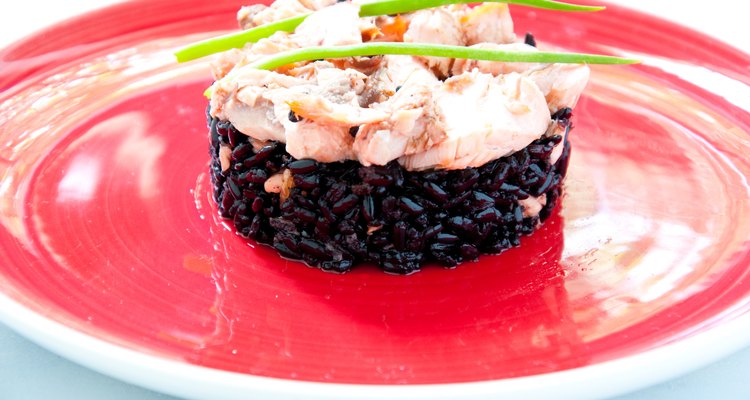
giovanni1232/iStock/Getty Images
Black rice is an heirloom variety of rice that contains high levels of pigments, which make each grain appear dark purple to black in color. Though the rice has been cultivated for years, black rice is gaining popularity in the American marketplace as an alternative to white rice due to its nutritional benefits. Consuming black rice provides your body with a number of nutrients, including some compounds not found in white or brown rice.
Calories
Consuming black rice provides your body with calories -- the energy your body requires to survive. A 3/4 cup bowl of black rice -- a 6 oz. serving -- contains 160 calories, according to LIVESTRONG.com's MyPlate. If you cook the rice in oil, or add butter to the cooked rice, you can significantly increase the calorie content of the rice: 1 tbsp. of olive oil and butter contains 119 and 100 calories, respectively. If you follow a calorie-controlled diet, or wish to reduce your calorie intake, flavor your black rice with herbs, spices or broths instead of added fat.
Carbohydrates
Most of the calories in black rice come from its carbohydrate content. Each 6 oz. serving of the cooked rice contains 34 g of total carbohydrates, accounting for approximately 80 percent of the calories in the meal. Of those 34 g of carbohydrates, 2 g come from dietary fiber, 1 g from sugars, and the remaining 31 g come from complex carbohydrates, such as starch. Overall, the carbohydrate content in one serving of black rice provides 11 percent of the suggested carbohydrate intake for someone following a 2,000 calorie diet. If you're following a low-carb diet, you should limit your black rice consumption.
Protein
Each serving of black rice also contains some protein. Six ounces of the rice provides 5 g of protein, representing approximately 12 percent of the rice's total calorie content. The protein in black rice contains some of the essential amino acids you require as part of your diet, but fails to provide all nine essential amino acids. To consume complete protein -- one containing all the required amino acids -- Go Ask Alice at Columbia University recommends combining rice with other sources of protein, like beans.
Antioxidants
One nutrient that sets black rice apart from varieties of white rice is antioxidants -- chemicals that may protect against cellular damage. The purple pigments that give black rice its distinctive appearance, called anthocyanins, also prove beneficial for your body. The U.S. Department of Health & Human Services indicates that black rice provides a rich source of anthocyanin antioxidants, as well as vitamin E, a type of antioxidant vitamin. Substituting black rice in place of white or brown rice in your diet can help boost you antioxidant intake, and may benefit your health.
Related Articles
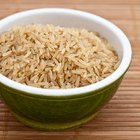
Nutrition and Protein in Rice
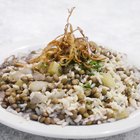
Do Lentils & Rice Have Calcium & ...

The Calories in Black & White Cookies

How to Make a Suit Look Like a Tux
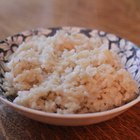
How to Cook Brown Basmati Rice

How to Dye Black Fabric Green
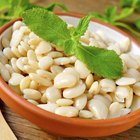
Calories per Cup of Cooked Navy Beans
Black Licorice Nutrition

How Many Calories in Black Beans and ...
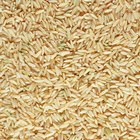
How Long After a Sell-By Date Can You ...

How to Clean Black Patent Leather Shoes

How to Make Sweet Brown Rice

What Is the Symbolic Meaning of a Black ...
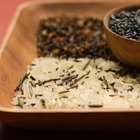
How to Cook Black Sweet Rice

Barley Malt Syrup vs. Brown Rice Syrup

How Many Calories in a Hershey Bar?

The Best Brands of Chocolate to Eat For ...

Nutrition From Beans & Rice
Keurig Coffee Nutrition

What Colors Do I Mix for Beige Frosting?
References
Writer Bio
Sylvie Tremblay holds a Master of Science in molecular and cellular biology and has years of experience as a cancer researcher and neuroscientist.
Photo Credits
giovanni1232/iStock/Getty Images